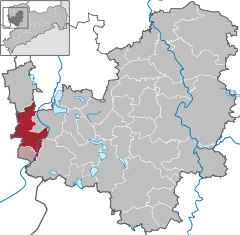Pegau
| Pegau | ||
|---|---|---|
| ||
 Pegau | ||
Location of Pegau within Leipzig district 
 | ||
| Coordinates: 51°10′0″N 12°15′0″E / 51.16667°N 12.25000°ECoordinates: 51°10′0″N 12°15′0″E / 51.16667°N 12.25000°E | ||
| Country | Germany | |
| State | Saxony | |
| District | Leipzig | |
| Municipal assoc. | Pegau | |
| Subdivisions | 3 | |
| Government | ||
| • Mayor | Peter Bringer | |
| Area | ||
| • Total | 48.61 km2 (18.77 sq mi) | |
| Elevation | 127 m (417 ft) | |
| Population (2012-12-31)[1] | ||
| • Total | 6,365 | |
| • Density | 130/km2 (340/sq mi) | |
| Time zone | CET/CEST (UTC+1/+2) | |
| Postal codes | 04523 | |
| Dialling codes | 03 42 96 | |
| Vehicle registration | L | |
| Website | www.pegau.de | |
Pegau is a town in the Leipzig district in the Free State of Saxony, Germany, situated in a fertile plain, on the Weiße Elster, 18 m. S.W. from Leipzig by the railway to Zeitz.
It has two Evangelical churches, that of St. Lawrence being a fine Gothic structure, a 16th-century town-hall; a very old hospital and an agricultural school. In the 19th Century its industries included the manufacture of felt, boots and metal wares.
History
Pegau grew up round a Benedictine monastery founded in 1096, but does not appear as a town before the close of the 12th century. Markets were held here and its prosperity was further enhanced by its position on a main road running east and west. In the monastery, which was dissolved in 1539, a valuable chronicle was compiled, the Annales pegavienses, covering the period from 1039 to 1227.
The town hosted witch trials in 1604-1605.
References
- ↑ "Statistisches Landesamt des Freistaates Sachsen – Bevölkerung des Freistaates Sachsen jeweils am Monatsende ausgewählter Berichtsmonate nach Gemeinden". Statistisches Landesamt des Freistaates Sachsen (in German). 17 June 2013.
External links
References
 This article incorporates text from a publication now in the public domain: Chisholm, Hugh, ed. (1911). Encyclopædia Britannica (11th ed.). Cambridge University Press
This article incorporates text from a publication now in the public domain: Chisholm, Hugh, ed. (1911). Encyclopædia Britannica (11th ed.). Cambridge University Press
